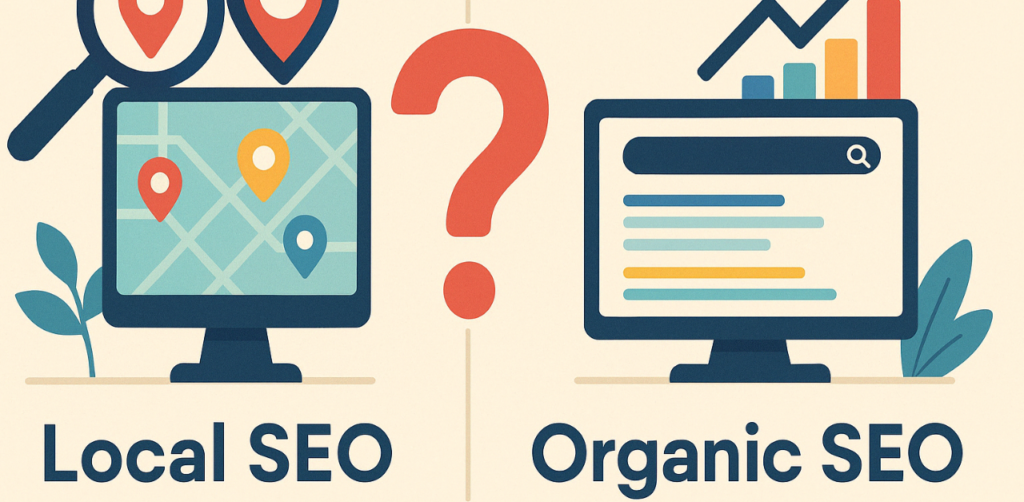Most home buyers today begin their journey online. They use search engines to compare property listings, check local market trends, and connect with real estate agents. If your real estate website is invisible in search results, you’re losing potential clients to competitors. Search engine optimization (SEO) shapes whether buyers discover your business or move on to other websites. According to Statista, nearly 100% of home buyers aged 24-57 use the internet to search for homes. That’s why having a strong online presence is more important than ever.
A strong real estate SEO strategy provides search engines with the right signals, improves your site’s performance, and generates leads. By following proven SEO strategies, you can turn your website into a steady source of more qualified leads.
At Web Search Marketing, we help real estate professionals implement technical SEO, local SEO strategies, and on-page SEO that improve visibility. If you’re wondering how to boost your real estate website traffic with SEO, the following tips will guide you.
Table of Contents
Tip #1: Conducting Comprehensive Keyword Research
Keyword research is the first step in every real estate SEO strategy. Without it, your website may never appear in the right search results where potential buyers search. Real estate refers not only to property but also to how you position your site with relevant keywords that match user behavior.
When conducting keyword research, focus on long-tail keywords and location-specific keywords. Terms such as “homes for sale in Las Vegas” or “condos near Henderson” can drive local search results and attract potential clients ready to buy. Adding relevant keywords in H2s and meta descriptions helps search engines understand your website’s content.
SEO tools like Google Analytics and Google Search Console reveal keyword rankings, search rankings, and your website’s performance. They also uncover gaps where you can add relevant content, such as blogs about community events, real estate trends, or local businesses. Conducting keyword research is an ongoing process, so update your SEO efforts regularly to stay current with market trends.
Tip#2: Optimizing Your Real Estate Website
Optimizing your real estate website is just as important as finding the right keywords. Search engines reward websites that are mobile-friendly, fast, and easy to navigate. If your site speed is poor or not mobile-friendly, buyers tend to leave quickly, which can lower your search rankings.
- Start with technical SEO fixes. Compress high-quality images, improve page speed, and utilize structured data to ensure property search pages and real estate listings are clear and concise. Structured data helps search engines understand what each listing offers, improving your visibility in search engine results.
- On-page SEO matters as well. Add keyword-rich headings, meta descriptions, and internal links between property listings, real estate blogs, and service pages. This makes it easier for both users and search engines to navigate your site.
- Don’t ignore local SEO strategies. Update your Google Business Profile with contact details, link it with Google Maps, and submit it to local directories. Tracking SEO performance in Google Analytics reveals where your website’s content is strong and where additional SEO efforts are needed.
Tip#3: Creating High-Quality Content
Content is the backbone of real estate SEO. Without relevant content, your website won’t bring more qualified leads. Search engines seek out valuable content that aligns with what home buyers and potential clients are looking for.
Effective content includes:
- Real estate blogs
- Detailed property listings
- Home buyer guides
- Virtual tours
These provide valuable content for your target audience and keep buyers engaged. Adding market trends, community events, and local businesses to your website content strengthens your real estate SEO strategy.
Always include relevant keywords, long-tail keywords, and location-specific keywords in your content and H2 Headers. For example, a blog titled “Real Estate SEO Tips for Local Market Trends in Nevada” improves keyword rankings while helping buyers find relevant content.
At Web Search Marketing, we help real estate agents develop and implement ongoing content strategies that enhance their search rankings. To help provide search engines with the necessary signals:
- Writing blogs
- Updating property search pages
- Utilizing structured data all
Creating website content is an ongoing process that supports your seo performance for the long term.
Tip#4: Building Backlinks

Backlinks remain one of the most powerful SEO signals. When other websites link to your real estate business, search engines view your site as more trustworthy, which improves search rankings.
To earn quality backlinks, connect with local businesses, write guest posts for other real estate blogs, and submit your property listings to local directories. Mentioning community events and real estate trends in your content also encourages other websites to link back to your content, thereby increasing its visibility and authority. These quality backlinks help drive more traffic and generate leads.
Avoid spammy backlinks or low-quality sources, as they harm your SEO performance. Focus on building backlinks naturally through relevant content and partnerships in the real estate industry.
Backlinks also strengthen local SEO. When local directories or businesses link to your real estate website, search engines associate you with local search results. This makes it easier for potential buyers to find you and helps your real estate seo strategy deliver more qualified leads.
Tip#5: Monitoring and Analyzing Performance
Real estate SEO efforts should always be measured and evaluated. Use Google Analytics and Google Search Console to monitor keyword rankings, the website’s performance, and search engine results. These tools show:
- User behavior
- Page speed
- Site’s performance
Tracking SEO performance helps you refine your SEO strategies. For example, if your keyword rankings drop, you may need to adjust your real estate SEO strategy, improve meta descriptions, or add relevant content. Monitoring search rankings and comparing them with market trends ensures your SEO efforts stay effective.
SEO performance is an ongoing process. Search engines update their algorithms, real estate trends change, and user behavior shifts. Regularly reviewing your site’s performance helps generate leads and maintain strong search rankings.
Set clear goals such as increasing traffic, boosting keyword rankings, or improving conversions. Use SEO tools to track progress. For instance, if your site speed improves, see how it affects bounce rates. If your real estate blogs get more visits, check if that results in more property search inquiries. Web Search Marketing can help set up tracking that directly shows how SEO efforts impact your real estate business.
Tip#6: Managing Online Reputation

In the real estate industry, reputation matters. Online reviews on Google Business Profile, local directories, and other websites influence search engine rankings and local search results. A strong online reputation enables real estate professionals to establish trust with potential buyers and clients.
Encourage satisfied home buyers to leave reviews. Respond to feedback and show that your real estate business values its target audience. Online reputation management also includes:
- Monitoring real estate blogs
- Community events
- Local businesses
Web Search Marketing helps real estate agents manage reputation and combine local SEO strategies with review campaigns. A strong online presence enhances your search rankings and attracts more qualified leads.
Reputation management is not just about reviews. It also involves how your business appears in local search. Use your Google Business Profile to update hours, phone numbers, and property listings. Keep your profile accurate so buyers can search and find reliable information. A strong online reputation signals to search engines that you rank higher in local search results.
Advanced Real Estate SEO Strategies for Lasting Results
Beyond the six main tips, there are advanced SEO strategies that can push your real estate website higher in search results. To stay ahead in the competitive real estate industry, you need more than basic SEO. These advanced strategies will help your real estate website rank higher in search results and attract more qualified leads.
1. Combine Google Ads with Organic SEO
Running Google Ads can put your property listings in front of potential buyers immediately. While paid ads deliver fast visibility, pairing them with organic SEO efforts builds long-term growth. This balanced approach ensures you show up both in search results ads and organic rankings, covering more ground when buyers search.
2. Strengthen Technical SEO for Better Indexing
Technical SEO makes it easier for search engines to crawl and index your real estate website. Create XML sitemaps so search engines can find all your property search pages and real estate blogs. Add structured data to property listings so search engines understand what each page represents. Improving internal links between listings, blogs, and service pages also helps boost keyword rankings and search engine results.
3. Expand Local SEO Beyond Google Business Profile
Your Google Business Profile is essential, but local SEO goes further. Add your real estate business to local directories, partner with local companies, and publish updates about upcoming events. Mentioning schools, parks, and local market trends in your website content shows buyers and search engines that you are an authority in your area. This helps you rank higher in local search and connect with home buyers looking for property listings nearby.
Real Estate Success with a Strong SEO Strategy
Implementing a solid SEO strategy, including keyword research, on-page optimization, and local SEO tactics, helps real estate websites rank higher on search engines. This means more visibility for your real estate listings and more opportunities to attract potential clients.
Whether you’re a real estate agent or run a larger real estate company, focusing on SEO efforts can significantly improve your website traffic and online reputation.
Do you need help with real estate marketing? Book a consultation with Web Search Marketing today to increase your real estate website traffic!































